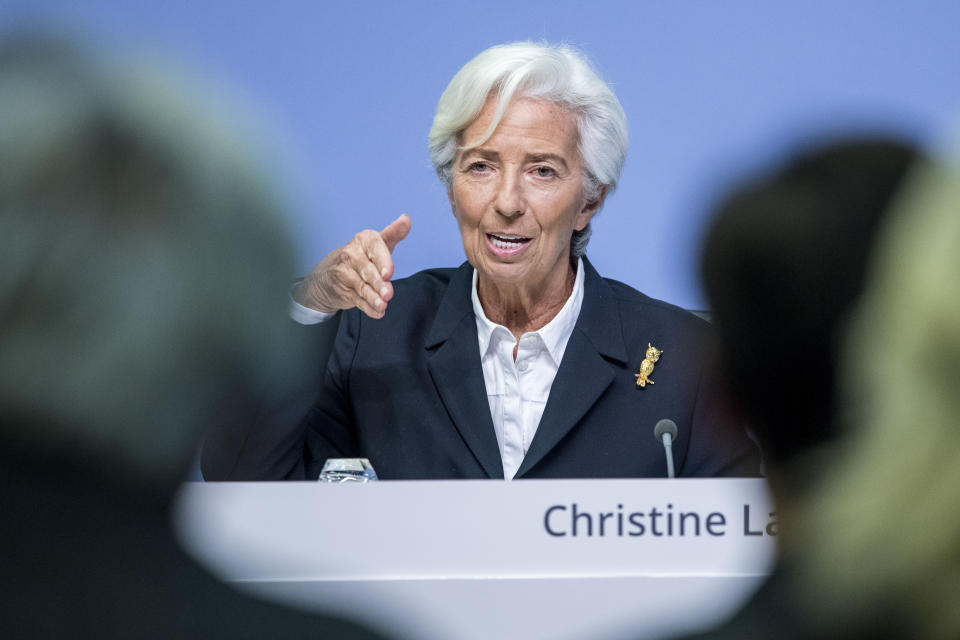ECB leaves rates unchanged but introduces coronavirus stimulus package

The European Central Bank (ECB) on Thursday left interest rates unchanged, but announced a sweeping stimulus package designed to curb the economic impact of the coronavirus pandemic on the eurozone.
The bank announced additional long-term loans to provide “immediate liquidity support” to the eurozone’s financial system, and said that it would expand its quantitative easing programme by making an additional €120bn (£106bn) in asset purchases this year.
From June, the bank will repurpose its existing long-term refinancing facility to essentially provide cheap loans to eurozone banks, hoping to boost lending to SMEs most affected by the spread of coronavirus.
The bank also said it would temporarily let banks run lower capital ratios, meaning that they need to hold less reserves, to facilitate further lending.
Read more: FTSE 100 on track for worst day since 1987 as coronavirus panic grows
ECB president Christine Lagarde on Thursday said that the coronavirus pandemic had resulted in “heightened market volatility,” and called on governments to launch an “ambitious and coordinated fiscal response” to the fallout.
Lagarde said she was “particularly worried” about “the complacency and slow-motion process” exhibited by European governments.
“The latest indicators suggest a considerable worsening of the near-term growth outlook,” she said, noting that measures designed to contain the further spread of the virus were “adversely affecting economic activity.”
In its statement, the bank’s governing council said that, while it did not see “material signs of strains” in the banking system, the expansion of its long-term refinancing operations would provide “an effective backstop in case of need.”
The governing council’s decision not to cut its key deposit rate came as a disappointment to markets.
Though the move would have been largely symbolic — the rate is already in record negative territory — some analysts had suggested that it would have demonstrated the ECB’s willingness to bolster the eurozone economy.
Lagarde also panicked investors and caused a spike in Italian bond yields by saying that it was not the ECB’s job to close the spread — or difference — between bond yields in eurozone countries.
She was later forced to walk back the comments in an interview with CNBC, saying the ECB was “fully committed to avoid any fragmentation” in bond markets.
Noting that the package was “clearly not enough to placate the financial markets,” analysts at Nomura said, however, that there is “little more the ECB can realistically do to insulate the economy from the spreading virus.”
After a decade of crisis fighting, the ECB is more restricted than other central banks, such as the Bank of England and US Federal Reserve, both of which slashed interest rates in recent days.
Policymakers from the ECB have been warning that its monetary policy toolkit has been exhausted, giving it few options to tackle a downturn.
Read more: Chancellor announces £30bn coronavirus spending package
The central bank already holds a huge amount of the eurozone’s outstanding government debt, and its asset-purchasing programme has been limited by a paucity of bonds to actually buy.
Economists have warned that the bloc’s economy could be pushed into a recession by the impact of the coronavirus.
The epicentre of the virus outbreak in Europe, Italy, is the eurozone’s third-largest economy — and the virus has quickly spread to France, Germany, and Spain, each of which now have more than 2,000 cases.
EU leaders have thus far declined to launch a coordinated pan-European fiscal stimulus package to temper the economic impact, and Lagarde’s renewed calls for such stimulus are unlikely to spur them into action until later in the month, when the European Council meets.
The Bank of England on Wednesday slashed its benchmark interest rate and introduced a new funding scheme for loans to SMEs, while the UK government launched a £30bn fiscal stimulus package.

 Yahoo Finance
Yahoo Finance 
